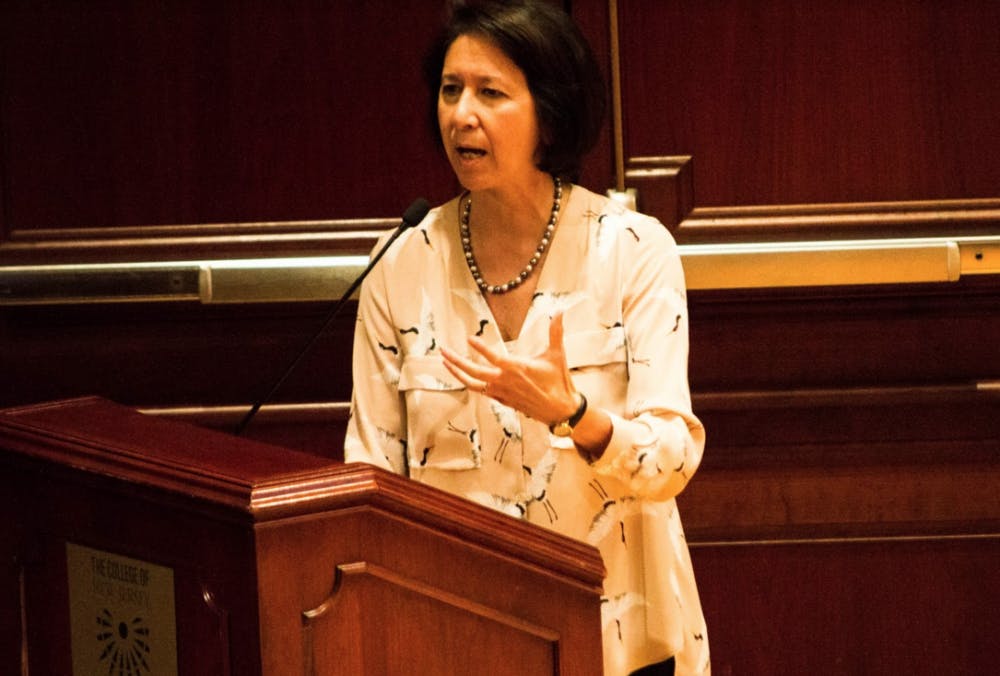By Judith Patrick
Staff Writer
Award-winning writer, filmmaker and producer Jennifer Lin visited Mayo Concert Hall on Friday, Oct. 17 to present a Brown Bag lecture on her quest to uncover her family’s experiences during the Chinese cultural revolution.
Lin has 30 years of experience as a journalist working as the Philadelphia Inquirer's New York financial correspondent, Washington foreign affairs reporter and Asia bureau chief.
She discussed book, "Shanghai Faithful: Betrayal and Forgiveness in a Chinese Christian Family," and the process in which she traced her family’s history back 150 years, all the way through their horrific experiences during China’s cultural revolution and how they overcame their many struggles.
Lin discussed how to go about tracing back family histories, and how investigative journalism and narrative storytelling can go hand in hand with this process.
Lin’s father left China before it became the People’s Republic of China, and had limited contact with his family still trapped in their native country. Thirty years later, when Lin was about 18 years old and the U.S. began to formally open relations with China, she and her father returned to visit their family.
They learned of the atrocities that had been brought upon their family in the years they had been away.

Lin’s family was relatively prominent in the Chinese Christian community, and her family had suffered under the People’s Republic of China’s anti-Christian attitudes.
The small fragments of history shared to Lin during her trip sparked an interest to follow the story all the way back to the first Christian member of her family. She wanted to find out why, in a predominantly Buddhist and Confucian nation, someone would become a Christian.
Lin confessed that she was born a journalist and wanted to know, “What happened and why?”
Before officially starting her novel, she was writing the pieces on her family’s history as articles for the Philadelphia Inquirer. The more she wrote and researched, the more material she found.
“For every answer, I had another question,” Lin said.
Lin then went on to discuss what she calls the “alchemy of writing.”
Lin’s aunt, an amateur historian, had 12 pages of hand-written documents containing basic family history. Lin was able to turn those 12 pages into a 100,000-word novel in a rigorous and methodical journey.
Talking to her family and writing down their oral history was arguably the most important addition to her research. The younger members of her family who were born late into the Cultural Revolution were more willing to share their experiences.
Her older family members were hesitant to share their dark pasts out of fear of the old regime returning, but Lin advised the audience that the best tool she had with eliminating their hesitation was time. As time went on and more years passed, it became easier and easier to get information from her family.
Lin also found pictures and quoted statements from her grandfather, Reverend Lin Buji, in a passage from a textbook she was perusing. Through a journey of rabbit hole searches, she learned that during his time as a professor in Fuzhou, there was an instance when a small mob of anti-Christian communist students had taken Buji, put a dunce cap on his head and walked him through the streets like a dog. He had been denounced in a mass meeting and they tried to make him renounce his faith, but he steadfastly refused.
She was able to find within the missionaries’ personal letters and diaries actual accounts of what her grandfather had said that day.
“Then they said they would free him if he would renounce his faith, to which he replied, ‘I will never renounce my faith, you may kill me if you want to,’” wrote John Gowdy, president of Fukien Christian University.
Lin’s findings sparked an interest in investigating family history for audience members.
“I thought Lin’s presentation was very interesting because of the history she uncovered while researching her roots,” said Kathryn Cole, a freshman music education major. “She inspired me to find out more about my own family ancestry and history.”
Lin ended the speech with encouragement for those in the audience who may want to investigate their own family history.
“You can’t make anything up,” Lin said. “You have to follow every single lead, because you don’t know where those will take you … follow the paper trail because it will give you the texture you need to give a story context.”







